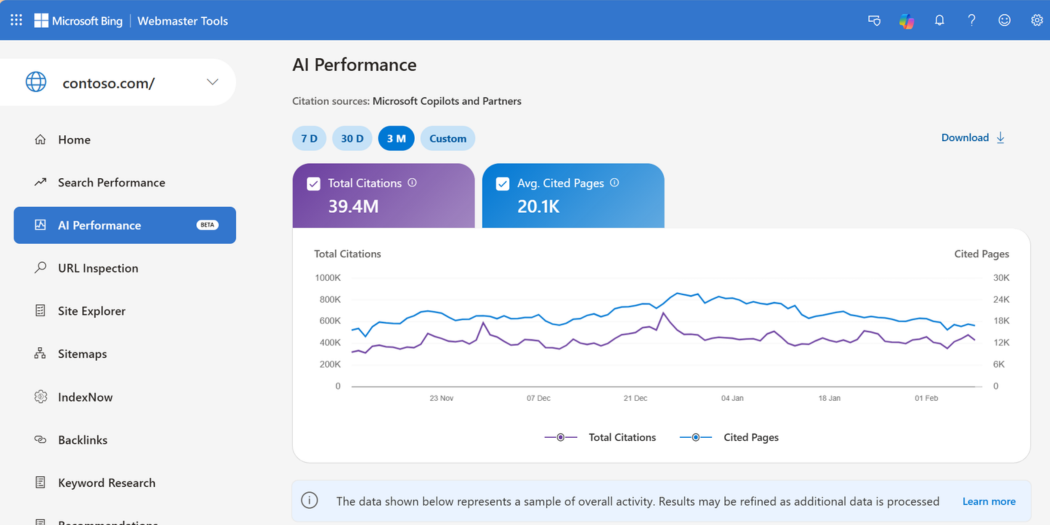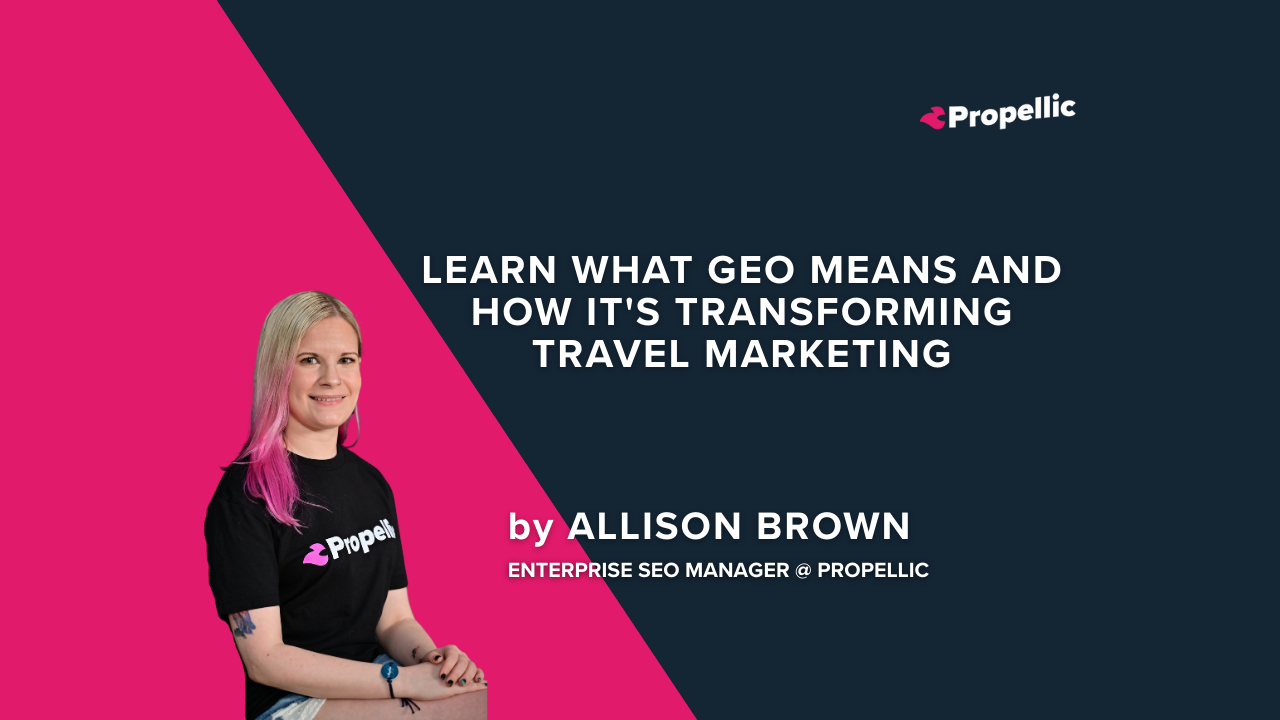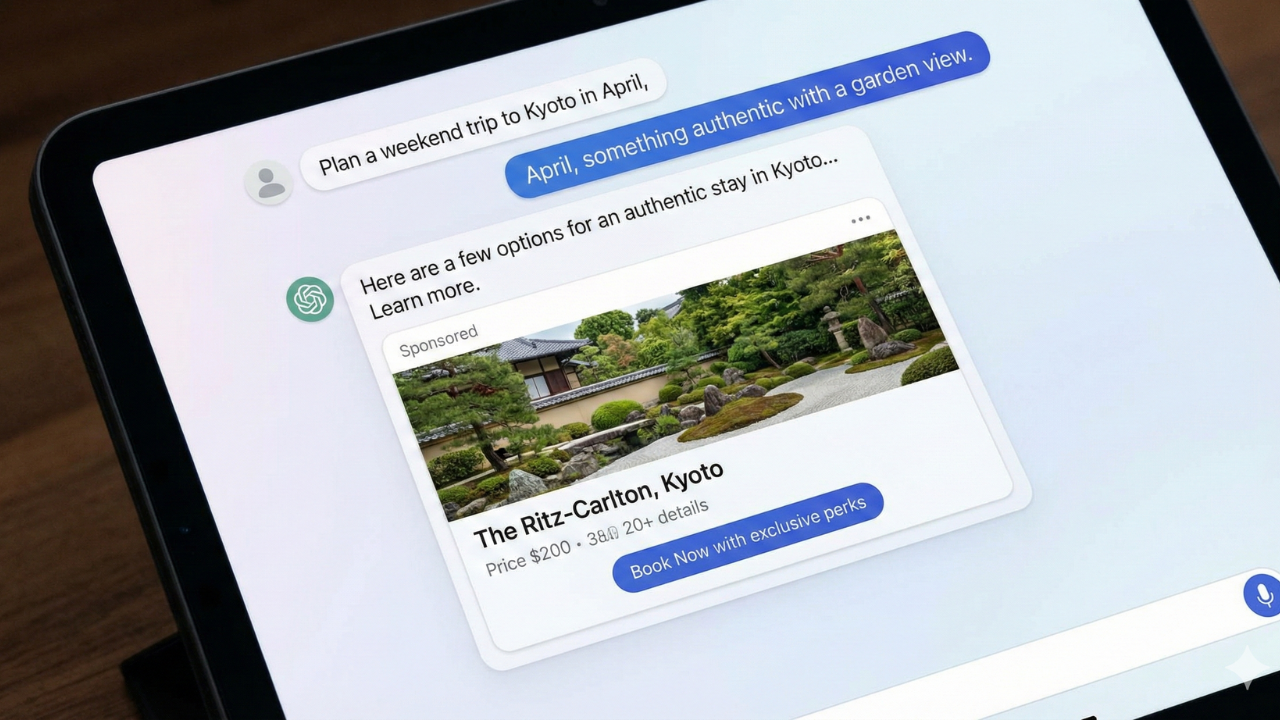There's a lot of change happening in the travel marketing space.
Overwhelming? Yes.
Boring? Never.
In today's NavLog:
- What's Actually Happening with AI-Mode?
- The Future of Travel Creative
- Google AI MAX: More Ads. Less Control
- Mastering Local SEO: A Strategic Imperative for Travel & Tourism Operators
- Our Preferred AI Tracking Tools
- Why AI Tracking Is More Broken Than You Think
- Propellic Co-Occurrence Scraper
- Travel Marketing Podcast: Trailblazing Tactics
THE END OF SEARCH?

By: Brennen Bliss, CEO @ Propellic
Two weeks ago, I wrote about Google putting AI in the driver's seat of search results. The response was immediate: dozens of emails asking "When is this actually happening?" and "What should we do right now?"
Well, Sundar Pichai just gave us more clarity, and spoiler alert - it's happening faster than most people think.
What's Actually Happening Here?
Google's CEO just laid out the roadmap: AI Mode starts as a "separate tab for people who really want to experience that," but successful features will keep "migrating to the main page."
Think of it as Google's way of saying "We're testing this on the early adopters before we force it on everyone."
AI Mode isn't just another AI Overview snippet. This is a complete conversation-based search experience where users can ask follow-up questions, get clarifications, and basically treat Google like their personal travel agent.
When someone searches "family-friendly tours in Costa Rica," they won't just get a list of links. They'll get an AI that can answer "What about for kids under 8?" and "Which ones include wildlife viewing?"
My prediction? This becomes the default search experience within 12 months, not the 2-3 years most people are assuming.
Why This Matters for Travel Companies
Here's what keeps me up at night: people are inherently lazy, and AI Mode makes being lazy incredibly easy. Why click through five different tour operator websites when you can just ask Google's AI to compare them for you?
Your carefully crafted destination guides and "things to do" content that currently drives discovery traffic? That's about to become AI training data instead of website visits.
The travel industry relies heavily on that top-of-funnel content to build audiences for retargeting - and that pipeline is about to get seriously disrupted.
But here's where it gets interesting for travel: unlike buying a phone case on Amazon, travel is complex. People want recommendations, reviews, and reassurance.
They'll ask follow-up questions about weather, difficulty levels, and what to pack. AI Mode is designed exactly for this type of conversational discovery.
The Business Reality Check
Let's be clear about what doesn't change: people still need to book somewhere. AI can recommend the perfect sunset cruise in Santorini, but it can't enter your credit card details (yet - we’ll see what happens with Google’s Project Mariner when it’s ready for prime time).
What does change is the discovery and planning phase. Instead of visiting 10 different websites to compare options, travelers will have one conversation with Google's AI.
The winners will be the companies that AI mentions and recommends consistently.
This isn't about ranking #1 for "best tours in Thailand" anymore. It's about being the tour operator that gets mentioned when AI Mode suggests Thailand tour options.
The new currency is mentions, not clicks. We talked about this in our clients-only webinar yesterday.
When This Actually Happens
Google's playing this smart - they're not pulling a "New Coke" and switching overnight. The migration happens when features prove they work better than the current experience.
But here's the catch: Google needs to solve the monetization puzzle first.
With nearly 80% of their revenue coming from ads (much of which is search ads), they can't afford to roll out an experience that tanks click-through rates without a plan to replace that revenue.
AI Mode conversations inherently reduce clicks, which means fewer ad impressions and less revenue per search.
Based on Pichai's comments and Google's testing patterns, I expect:
- Q3 2025: AI Mode becomes more prominent, possibly default for certain query types
- Q3-Q4 2025: Major feature migration to main search interface
- H1 2026: AI Mode conversation experience becomes the primary search interface
The trigger will be user engagement metrics and, critically, a sustainable ad revenue model within AI conversations. When people spend more time getting better answers through AI Mode than clicking through traditional results, and Google figures out how to monetize those interactions, they'll make the switch.
The Bottom Line
Google just told us exactly what's coming and roughly when. The companies that adapt their content strategy now will be the ones AI systems learn to trust and recommend.
The ones waiting for "more clarity" will be playing catch-up while their competitors get mentioned in AI conversations.
Your runway starts now. Use it wisely.
.png)
By: Dasha Gastol, Performance-Driven Marketing Leader @ Propellic
AI-Powered Storytelling Will Transform Travel Marketing
Generative tools like Veo3 and Midjourney remove the need for costly shoots and long production timelines. Travel brands can now create cinematic visuals tailored to specific audiences or destinations in hours, not weeks.
This enables personalized storytelling at scale—testing and refining creative across the funnel quickly and cost-effectively.
Always-On, Dynamic Creative Will Become the Standard
As AI integrates into creative workflows, brands will shift from static campaigns to always-on strategies. AI will not only generate content but also adapt it in real time based on demand, seasonality, and behavior.
Creative can now be localized and scaled efficiently, giving even smaller brands the speed and reach of global players.
GOOGLE AI MAX: MORE ADS. LESS CONTROL.
.png)
By: Brennen Bliss, CEO @ Propellic
What is AI Max?
We’ve been testing AI Max - a new Google Ads feature - in beta. It’s not available across many ad accounts yet, but will be soon.
Here’s what we’ve learned:
AI Max isn't Google's attempt to kill Search campaigns. It's a feature you can toggle on within your existing Search campaigns.
Here's the catch though: when you flip that AI Max switch, your carefully crafted phrase and exact match keywords start behaving like broad match.
Google essentially says "thanks for the keyword suggestions" and then does whatever it wants with them. Fun.
How AI Max Changes Your Search Campaigns
The real kicker is something called "Text Customization & Final URL Expansion." This is Google-speak for "we're going to decide what your ad says and where it sends people." Sound familiar? It should - this feels like PMAX logic creeping into Search campaigns.
You'll also start seeing a mysterious "Keywordless" section in your Search Term Reports. This is where Google will show you all the searches they decided were relevant without any keyword to blame it on.
The good news? Negative keywords still work, and campaign prioritization stays the same: Exact Match beats Phrase beats Broad beats whatever AI-based relevance Google dreams up. You'll just need to switch to Smart Bidding (max conversions or conversion value) to use any of this.
What This Means for Travel Advertisers
For travel companies, this presents the classic Google trade-off: potential performance gains in exchange for control.
Google will decide if someone searching "Paris hotels" should see your Eiffel Tower tour ad and land on your Paris itinerary page.
This might work if you're a large OTA with inventory everywhere. But if you're a boutique tour operator in Croatia, do you really want Google sending searchers to random landing pages when they're looking for your specific experiences?
The upside? Google's getting better at understanding search intent, especially for travel queries. The downside? You're essentially letting the algorithm play travel agent with your ad budget.
The Smart Implementation Strategy
Here's what I'm telling our clients to plan for when the rollout is global: don't go all-in on AI Max. Keep your core Search campaigns running normally and create separate test campaigns with AI Max enabled.
Think of it as a 70/30 split - most of your budget stays under your control while you test Google's AI magic on the side. This is consistent with our “always be testing” mentality.
Start testing with your broader, less brand-specific campaigns first. If you sell tours in multiple destinations, that's a good candidate. Your branded campaigns and highly specific product campaigns? Keep those on manual for now.
The Bottom Line
AI Max feels like Google's way of making Search campaigns more like PMAX without admitting that's what they're doing. It might work for some travel companies, especially those with diverse inventory and flexible landing page strategies.
But remember: Google's definition of "relevant" and yours might not align, especially when someone's planning a $5,000 vacation. Test smart, measure everything, and don't hand over the keys to your entire account just because Google promises better performance.
The feature is rolling out now to select accounts. If you get access, treat it like any other test - with healthy skepticism and a solid measurement plan.


By: Jeff Riddall, Sr. SEO & GEO Manager @ Propellic for Search Engine Journal
Paul Teddy, Sr. Director of Operations @ Propellic, shares his thoughts on the acceleration of travel research & planning here:
I was reviewing conversions from AI-generated referral traffic today (mainly from ChatGPT in this case). It’s still small, as in less than 2% of total Organic revenue for this brand, but it’s growing, and it got me thinking:
Sure, most of us in the industry know many "obvious" changes that are coming as AI search replaces traditional search. But many changes ahead are in areas we don't often think about because historically, they have remained stable for years, if not decades.
🕒 Time to Conversion
In travel, we’ve long known the journey from idea to booking can take 120+ days. But AI is accelerating that dramatically. Tasks like comparing destinations, reading reviews, or lining up tour options were spread across weeks of research... can now be condensed into just a handful of AI queries.
Instead of 20+ organic sessions, we’re seeing decisions made with just a few prompts and refinements, followed by direct, branded, or navigational sessions to book.
👥 Who is Searching
Thanks to the above, AI is going to reshape who participates in search. People who previously found the process too time-consuming or overwhelming may now engage directly.
I expect we’ll see new audience segments emerge from travelers who haven’t historically been the trip planner in the family, stepping in thanks to reduced friction.
Just a thought I had! As we lay the groundwork for a shift toward AI-driven search, we should be ready to revisit each and every old assumption!
OUR PREFERRED AI TRACKING TOOLS

By: Brennen Bliss, CEO @ Propellic
With all this talk about AI search, you probably want to know if your content is actually showing up in AI responses.
Good news: there are tools for that.
Less good news: most of them are pretty rough around the edges.
We've tested Scrunch, Peec, Profound, and several others over the past six months. After way too much trial and error, we landed on Peec for our clients. It's not perfect, but it gives us the clearest picture of which travel companies are getting mentioned in AI responses and how often.
We even tried building our own tracking tool (because we're gluttons for punishment), but quickly realized that a team of actual software engineers building this full-time would create something better than us hackers cobbling together Python scripts at 2 AM.
Speaking of questionable decisions: Remember last edition where I pointed out that Adobe apparently decided to create an "LLM Optimizer?" Yes, the Photoshop people are now trying to optimize content for AI search. Nobody owns this industry yet - and Ahrefs and SEMRush are making their swings at it too.
Supposedly, Profound now has a “Conversation Explorer” that gives you visibility into what people are actually searching in LLMs, but I’m not 100% sure what the methodology here is, so I can’t endorse it yet.
If you're serious about tracking your AI visibility, start with Peec. It's not cheap, but neither is flying blind while Google's AI decides which tour operators to recommend.
The alternative is checking manually by asking ChatGPT and Claude about your destinations every week, which is about as scalable as it sounds.
But, before you sign up for this tool… read the next section.
WHY AI TRACKING IS MORE BROKEN THAN YOU THINK

By: Brennen Bliss, CEO @ Propellic
Here's the problem with all these AI tracking tools: they're testing generic queries when AI models are getting incredibly personal in their responses.
When I ask ChatGPT "Find me a hotel in New York," it doesn't give me the same answer it gives a family of four from Ohio. It knows I travel constantly, prefer boutique properties, want a good bar, and avoid Times Square like the plague.
A parent searching the same thing gets family-friendly recommendations with connecting rooms and breakfast included.
This means your AI tracking data might be completely wrong for your actual customers. That fancy dashboard showing you rank #3 for "best restaurants in Rome?" Great, but what if you're targeting honeymooners and the tracker is using a generic business traveler persona?
The Fix: Persona-Based Tracking
Start building specific customer personas into your AI tracking queries. Instead of just "luxury hotels in Tuscany," test "luxury hotels in Tuscany for anniversary celebration" or "luxury hotels in Tuscany with wine tours."
Most of these tools let you customize the context or "user type" in your queries. Use it. Your 45-year-old adventure traveler gets different recommendations than your 28-year-old luxury honeymooner, even when they search identical terms.
The goal isn't to see if you show up in AI responses - it's to see if you show up for the right people at the right time. Everything else is just vanity metrics with extra steps.

One of the key forces in AI visibility optimization is how frequently a brand name shows up next to a topic.
Propellic is currently building a tool that allows you to check your brand name against a topic across the internet, as well as comparatively across topics and across competitors. We’ll be sharing that here when it’s ready for public release.
TRAVEL MARKETING PODCAST
TRAILBLAZING TACTICS: CAMPAIGN WINS, LEARNING CURVES & KPI MASTERY
In this episode of "Trailblazing Tactics," hear from Barbara, Global Director of Marketing and CRM at Summit One Vanderbilt, as she reveals the strategies that have driven success for world-class attractions.
.png)

Head of Marketing - Remote Global or Austin, TX
Full-Charge Bookkeeper - Remote US or Austin, TX
Head of AI Video - Remote Global or Austin, TX
Account Executive - Remote North America or Austin, TX
Full-stack Web Developer - Remote Global
Senior Paid Media Strategist, Innovation & AI - Remote North America or Austin, TX
Head of AI Visibility Optimization / GEO - Remote Global or Austin, TX


Want To Level Up Your Travel Marketing?
Subscribe to the NavLog, our bi-weekly travel marketing roundup, where you’ll be the first to know about breaking news that impacts travel marketers and access exclusive performance marketing strategies and practical tips you can implement from the marketers at the leading edge of the travel industry.


.png)



